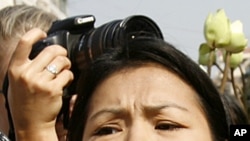A prominent survivor of Cambodia’s Khmer Rouge regime says she has lost confidence in the country’s United Nations-backed war crimes tribunal and is withdrawing her case. That decision comes after months of damaging allegations of political interference, possible judicial misconduct, and violations of victims’ rights by some tribunal staff. And it comes just days before the start of the trial of the surviving Khmer Rouge leaders.
Cambodian-American Theary Seng said Tuesday the U.N.-backed Khmer Rouge tribunal had turned into a political circus, and announced that she would no longer participate at the court as a civil party.
Seng is a lawyer who has played a leading role in the Association for Khmer Rouge Victims in Cambodia, becoming one of the most outspoken advocates for victims’ rights.
Seng explains why she has taken this dramatic step to withdraw her civil party application - which means she loses her right to take part in the tribunal.
“Because I believe that it is a complete sham - that I will no longer participate in political theater where I pretend to play-act in this stage that is supposed to be providing justice and contributing to justice when I know in my heart of hearts that this court is negating justice, that it is enabling impunity. More than that, that it is enabling cynicism,” she said.
Her decision to withdraw her own case comes as the court prepares to begin Case 002: the trial of the four surviving leaders of the ultra-Maoist movement.
The leaders are blamed for devising policies that caused the deaths of up to 2.2 million people during the movement’s 1975-79 rule. They deny charges of genocide, crimes against humanity, and war crimes.
Seng’s parents were murdered by Pol Pot’s ultra-Maoist movement, and the tribunal long ago recognized her as a civil party for Case 002. The term ‘civil party’ means the court agreed that some of the crimes the accused are charged with directly affected her.
In recent months the Khmer Rouge tribunal has encountered a number of serious allegations - from judicial misconduct to political interference.
Critics say the co-investigating judges deliberately botched their investigation into the third case. The case was closed in April without interviewing the suspects or most of the witnesses, and without visiting the crime scenes.
Court observers and survivors groups have said the court has been politically pressured to undermine the investigations.
U.N. officials have responded by urging Cambodia’s government to refrain from interfering in the tribunal’s work. But U.N. officials have not investigated the conduct of the court itself.
Seng says the United Nations should have stepped in and resolved the problems at the hybrid tribunal.
“It has basic duties to preserve judicial independence; it has [a] basic duty to do the proper work of an international court. The U.N. has failed in this respect - and I’m putting more emphasis on the United Nations than on our government because from the beginning I never had any trust in our government," she said. "I already know the stuff of what my government is made of. The other victims have the same belief that I do."
Compounding the issue is that the ongoing problems have skewed the focus away from the issues the court ought to be tackling: What happened under the Khmer Rouge regime, and who was affected.
“We’ve lost focus on the content, the substance of the crimes, and the history, the victims. So for me it’s been pulled so off track that I can no longer continue on this journey. I need to come back to what I believe to be true again,” Seng stated.
Seng insists she won’t stop speaking out for victims, but she won’t take part as a civil party.
While Seng has withdrawn, there are nearly 4,000 other civil parties who will participate in Case 002, which the court has described as the most complex since the Nazi trials at Nuremberg after World War II.
Case 002 starts Monday.












